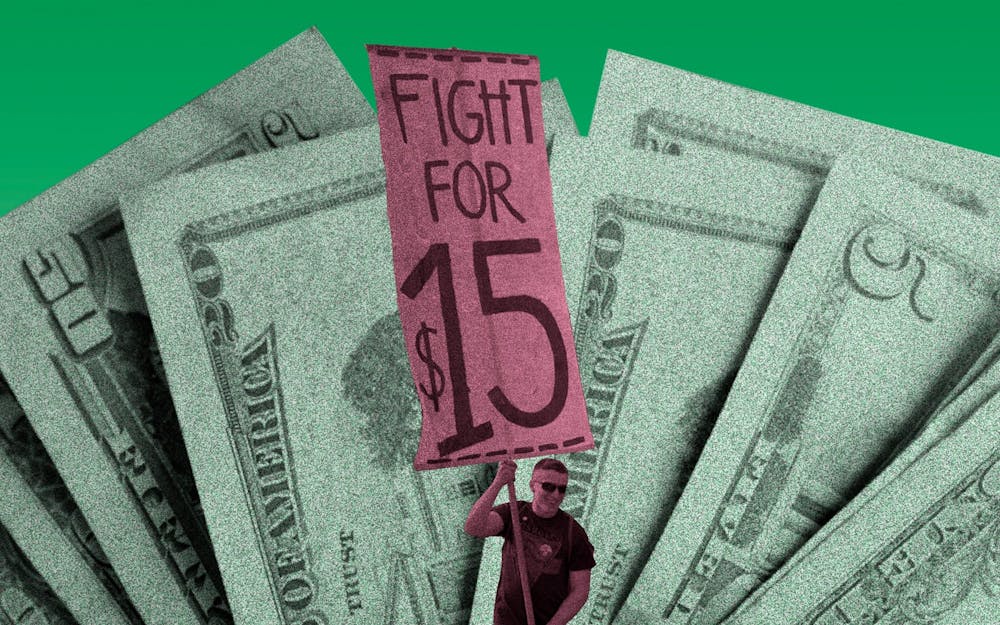Some minimum wage workers and political groups are pushing for Indiana legislators to support the passing of the Raise the Wage Act, which would increase the minimum wage. Many employees working for minimum wage support this increase, citing harsh conditions and unfair wages.
Democrats in the U.S. Congress introduced the Raise the Wage Act of 2021 on Jan. 26, according to a House Education and Labor Committee website press release.
If enacted by Congress in March, the Raise the Wage Act will introduce a new federal minimum wage of $15 an hour, with gradual implementation by June 2025. The current federal minimum wage is $7.25 an hour, according to the Congressional Budget Office website.
College Democrats of Indiana tweeted Feb. 10 in support of the bill in Indiana. The College Democrats at IU supports the bill because the organization believes earning a living wage that covers basic necessities is a human right for all people, said AJ Strange, sophomore and College Democrats at IU director of diversity and outreach.
“The current minimum wage in most places, including here in Indiana, is just not enough to live off of, even if you work full time all year,” Strange said. “For many, it’s still not enough, especially when people are trying to raise a family or they’re the only income of the house.”
If the Raise the Wage Act of 2021 is enacted, minimum wages over the federal $15 mandate need to be considered on a state-by-state basis to account for costs of living in different areas, Strange said. The standard of living in Indiana is much lower than in states like California, he said, so a minimum wage of $15 here would be livable, while in other states it would not be.
“I don’t think there’s any such thing as a one-size-fits-all,” Strange said.
College Republicans at IU President Brett Abbott said a wide range of opinions exist among the Republican Party concerning raising the minimum wage. Abbott said he personally feels like it is a bad idea.
According to a Congressional Budget Office report, raising the minimum wage could potentially cost about 1.4 million jobs. With COVID-19 hurting the economy, Abbott said potentially cutting jobs would not be a wise move to make.
“I think that given the failing economy right now during the global pandemic, it’d be a terrible idea to pass something that would cost 1.4 million jobs,” Abbott said. “Most of those jobs would be lower income workers as well.”
Abbott said many times companies will find ways to lower costs to compensate for the per hour wage increase, such as cutting back on benefits and decreasing employee hours. Small businesses would take the biggest hit if the minimum wage was increased because they often cannot afford to pay their employees more, Abbott said.
Minimum wage workers in Indiana said the difficult experiences were not worth the wages, especially because they could not live on them.
Sam Libecap, who graduated from IU in 2018, said the hardest jobs she has ever had to work were for minimum wage, but neither of the salaries were livable. She said she has been paid the minimum wage of $7.25 an hour as well as the restaurant server wage of $2.13 an hour.
“It can be really demoralizing,” Libecap said.
Libecap said while working minimum wage jobs, they often asked her to get on her hands and knees to scrub floors. She also said she frequently went through pairs of shoes while on the job, which was a financial burden her paycheck did not cover.
IU senior Corin Halter said she worked at a Steak ‘n Shake restaurant for $2.13 an hour in high school, and the physical labor she had to endure while working was not worth the money she earned.
“Paying someone $2.13 an hour makes you not feel like a real human being and that your work isn’t worth more,” Halter said. “That’s depressing. That’s not fair.”
Halter said the servers at the Steak ‘n Shake did not receive breaks during shifts but cooks and other workers who were paid more did. She said they were never allowed to leave early and often worked unpaid overtime.
Matthew, an employee at a McDonald’s restaurant, said working minimum wage in the fast food industry was not enough for them to live on and survive. They said they did not have enough disposable income in case of emergencies. They had to resort to sex work on the side to supplement their income, Matthew said.
Matthew said once they got promoted into a management position, they had more contact with the franchise owners. The gap in wealth between the two was apparent to them, they said. While workers are struggling to survive on minimum wage, they would see the regional owners drive Porsches and carry designer bags.
“I am having to deal with a roommate I can’t stand just so I can live in a halfway okay apartment and only hear gunshots twice a week instead of every night,” Matthew said.




